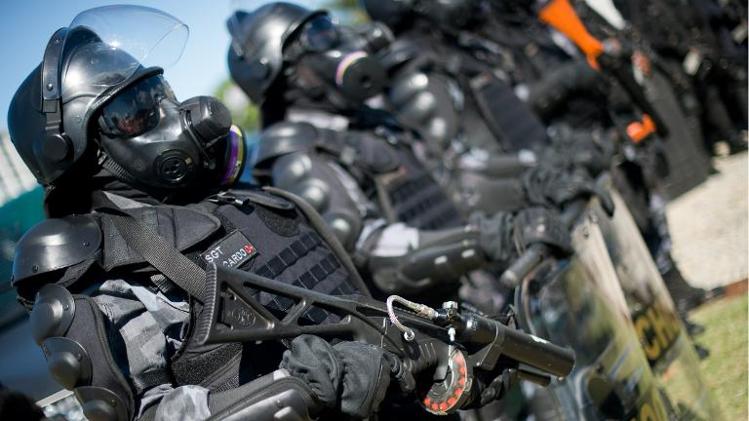 Police officers of the “Choque” special unit pose during the presentation of security forces for the upcoming FIFA World Cup, in Rio de Janeiro on May 30, 2014. (Photo: AFP Photo/Christophe Simon)
Police officers of the “Choque” special unit pose during the presentation of security forces for the upcoming FIFA World Cup, in Rio de Janeiro on May 30, 2014. (Photo: AFP Photo/Christophe Simon)
As Brazilians opposed to outrageous sums of public money spent on preparations for the upcoming World Cup protest with marches and strikes, the nation’s government and its police forces are boasting that they have planned for all contingencies ahead of the games, including plans to clamp down on dissent and disruption by establishing “security zones” and deploying armies of riot police in uniforms described as something out of a sci-fi movie.
In San Paulo on Wednesday, an estimated ten thousand people marched on the Arena Corinthians Stadium, where the international soccer tournament will begin next week, as they called for better treatment for the city’s homeless people as well as increased funding for public transportation, health services, and low-income housing.
 Anti-World Cup demonstrators take part in the so-called “World Cup without the people, I’m in the street again” protest in Sao Paulo, Brazil on June 4, 2014. (AFP Photo/Nelson Almeida)
Anti-World Cup demonstrators take part in the so-called “World Cup without the people, I’m in the street again” protest in Sao Paulo, Brazil on June 4, 2014. (AFP Photo/Nelson Almeida)
In addition, as of Thursday, the union of metro workers in San Paulo announced it was going on strike to protest low wages. A famously congested city to begin with, a worker’s strike during the World Cup—as international tourists pour in—would wreak havoc.
And last week in the capital city of Brasilia, indigenous protesters clashed with riot police on horseback as they voiced their anger at the dissonance between money spent on the games and the lack of resources available to the nation’s consistently neglected and disregarded populations.
“Who is the Cup for? Not us!” the demonstrators shouted. “I don’t want the Cup, I want money for health and education.”
As the BBC reports on the wave of protest:
A year ago, when Brazil hosted the regional Confederations Cup tournament, more than a million people took to the streets for similar reasons in a series of marches and protests that brought the normal workings of several cities to a halt.
In anticipation of continued protest and public discontent , Brazil’s President Dilma Roussef vowed on Tuesday to make “security” a top priority. According to Agence France-Presse, the nation’s “military police units have been kitted out with hi-tech uniforms making their members look like something out of Robocop,” a science fiction movie about a part-human, part-machine police officer. AFP adds
Around 157,000 troops and police will be deployed across the 12 host venues for the Cup, running from June 12-July 13.
Some 20,000 private security agents will also be on hand in the stadiums — some 1,800 per venue in an $860 million operation.
In addition, 120 police officers from 40 countries will collaborate with the Brazilian authorities as they jointly collate and assess intelligence.














